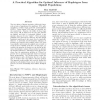Free Online Productivity Tools
i2Speak
i2Symbol
i2OCR
iTex2Img
iWeb2Print
iWeb2Shot
i2Type
iPdf2Split
iPdf2Merge
i2Bopomofo
i2Arabic
i2Style
i2Image
i2PDF
iLatex2Rtf
Sci2ools
109
Voted
ISMB
2000
2000
A Practical Algorithm for Optimal Inference of Haplotypes from Diploid Populations
The next phase of human genomics will involve largescale screens of populations for signi cant DNA polymorphisms, notably single nucleotide polymorphisms SNP's. Dense human SNP maps are currently under construction. However, the utility of those maps and screens will be limited by the fact that humans are diploid, and that it is presently di cult to get separate data on the two copies". Hence genotype blended SNP data will be collected, and the desired haplotype partitioned data must then be partially inferred. A particular non-deterministic inference algorithm was proposed and studied before SNP data was available, and extensively applied more recently to study the rst available SNP data. In this paper, we consider the question of whether we can obtain an e cient, deterministic variant of that method to optimize the obtained inferences. Although we have shown elsewhere that the optimization problem is NP-hard, we present here a practical approach based on integer linear pro...
Related Content
| Added | 01 Nov 2010 |
| Updated | 01 Nov 2010 |
| Type | Conference |
| Year | 2000 |
| Where | ISMB |
| Authors | Dan Gusfield |
Comments (0)

